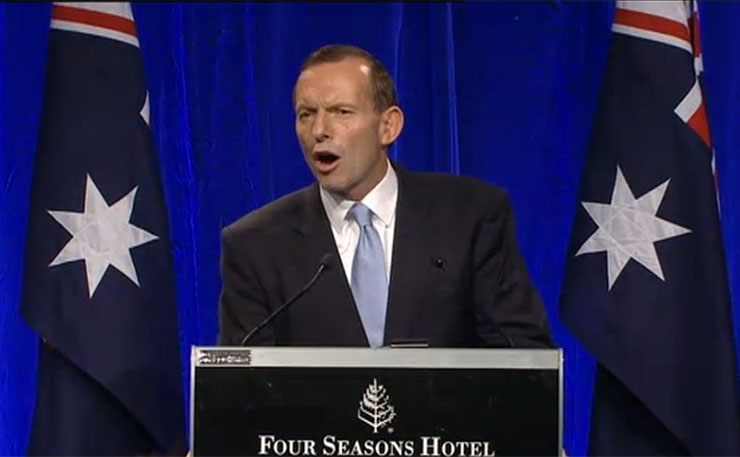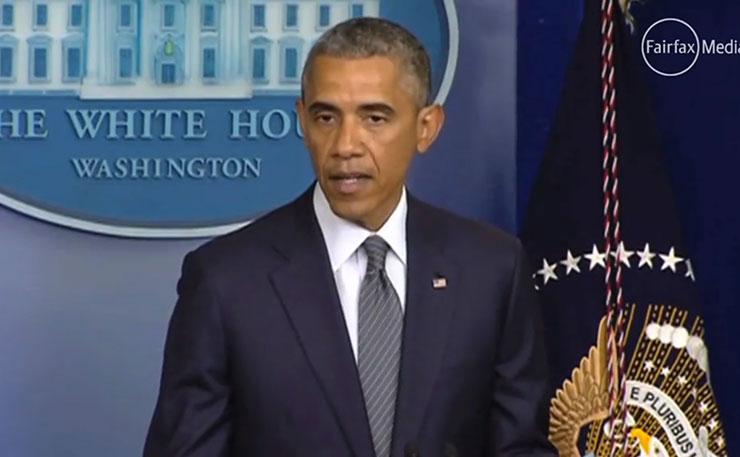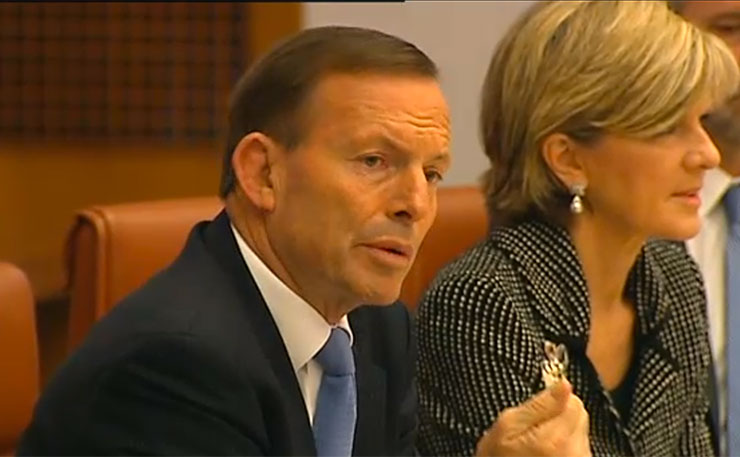In a fitting irony, Tony Abbott is beginning 2015 amid a rapidly changing political climate. Dr Lissa Johnson explores the pyschology behind the party and its policies.
After grasping at barnacles on a listing ship last year, the New Year has seen him lurching port and starboard over Medicare to increasingly ominous rumblings on his backbench. With continued mudslides in the polls and a gloomy economic outlook, eyes are on him as the next man overboard.“Out of touch” is among the reported cat-calls from his colleagues as they watch their leader flounder, an easy shot given the number of issues and ministers to which it applies.
There is perhaps no policy area, however, in which the Government has proven so spectacularly out of touch as climate change. Abbott’s stature never seemed to fully recover after his hubris on the subject gave way to humiliation at the G20 late last year.
Undeterred or unaware, he went on to demonstrate at the United Nations Climate Change Conference that, regardless of what the rest of the world is doing, his Government’s position on climate wasn’t about to budge.
As a result, Australia’s investment in renewable energy declined by 88 per cent in 2014, to the lowest level since 2002, with our global ranking falling 28 places from 11th to 39th. Meanwhile 2014 saw us coming second worst out of 61 countries on the Climate Change Performance Index, and the worst performing industrialised country, a drop of 21 places, with only Saudi Arabia beneath us.
But what possesses our Government to stand virtually alone in the world against genuine action on climate change, despite the costs?
If you look up “crazy” in the dictionary you will find, among other definitions, “foolish or impractical, senseless, totally unsound, full of cracks or flaws, an idea that makes absolutely no sense, very strange or unusual”. Synonyms include “absurd, preposterous, foolish, ridiculous, ludicrous, farcical, laughable, daft, idiotic, unbalanced and out to lunch”.
Of course “crazy” is not a psychological term. The MacMillan dictionary cautions to “only use ‘crazy’ in informal situations to describe silly behaviour and actions”.
Given our Government’s antics around climate change, however, usage might fruitfully be expanded to include, “political contexts where government behaviour is out of step with reality as defined by consensus across disciplines, political systems and party lines throughout the world”.
Even the International Monetary Fund and the World Bank accept the need to decarbonise. Last year World Bank Group President Jim Yong King said “we know that the world needs to fight climate change with much, much greater seriousness…. Taking action now will not only solve the problems of protecting the planet, but it will be a tremendous boost for economies.”
Even UK Tories find Australia “eccentric” and “baffling” on the topic of climate change, and our Prime Minister a “flat earther” on the subject, and Canada signed up to the Green Climate Fund at the G20.
With all that we now know about climate one needn’t be a psychologist to pronounce our Government divorced from reality on the issue.
The folly of linking our future to coal as the market abandons fossil fuels is plain. The wackiness of pronouncing coal “good for humanity” ahead of the latest Intergovernmental Panel Council on Climate Change (IPCC) report is plain odd. Undermining the renewable energy industry as its global market gathers momentum makes no sense.
If nothing else, US President Barack Obama’s speech on climate at the G20 should have been a reality slap with geopolitical force. That our leaders instead rebuked Obama, set him straight, or were too busy to listen made them look insular and uninformed. That our Prime Minister dismissed the US-China emissions agreement as too focused on the distant future, with reassurances that he would be “focusing not on what might happen in 16 years’ time… [but]…what we’re doing now” made him look more insular still.
That our Government is in a world of its own on climate change is clear. What is less obvious is why.

Even accepting their disdain for science, what possesses our leaders to fly in the face of Australia’s largest trading partners, closest allies, global markets, public opinion and votes, with 63 per cent of Australians believing that the Government should take a leadership role in reducing carbon emissions.
Why is this issue so important to our Government that they are willing to risk their own credibility, electability and international standing, never mind the future of the human race?
Given the lack of any defensible rational, pragmatic, economic or strategic reason to adopt a ‘suicide strategy’ on climate change and coal, it is likely that our Government’s motives are more psychological than anything else.
As political psychologist John Jost and his colleagues have noted, “Ideology is a potent motivational force; human beings are capable of committing atrocities (as well as acts of generosity and courage) and sacrificing even their own lives for the sake of abstract belief systems.”
From the vantage point of the political psychology literature, ideology derives its life-and-death force not from the strength of a person’s logical philosophical convictions primarily, or even from their ignorance, but from their psychological preferences, needs and goals.
Decades of research on the subject have converged to illuminate political ideology as a form of ‘motivated cognition’, or cognition that is powerfully shaped by emotion and psychological drives, whether conscious or covert.
For instance, left/right political orientation is consistently associated with certain psychological characteristics, some of which may explain our Government’s tenaciously obdurate climate stance.
One explanatory contender is a quality known as the need for cognitive closure, which correlates with conservatism and right leaning political views. It involves a tendency to seek fixed and firm answers to complex questions, driven by a desire to resolve ambiguity, and an impetus to ‘seize and freeze’ on opinions and ideas.
Given that climate change has been described as a ‘problem of wicked, unprecedented complexity’, it might make sense that it would elicit paroxysms of seizing and freezing from those on the far right.
However, even highly conservative governments and politicians around the world have embraced the climate cause. Even Margaret Thatcher believed that “The environmental challenge which confronts the whole world demands an equivalent response from the whole world. Every country will be affected and no one can opt out.”
Psychological conservatism, then, even in extreme form, is not explanation enough. There must be something more specific, psychologically speaking, that sets our Government apart.
The US Republican Senator James Inhofe might hold a clue. He is a climate denialist who was quoted by Abbott’s business advisor Maurice Newman following the G20, to back up Newman’s criticisms of the US–China emissions deal.
Inhofe is on the record as previously claiming that the Bible contradicts climate change. He explained his strong feelings on the subject in a radio interview, saying, “The arrogance of people to think that we, human beings, would be able to change what He is doing in the climate is to me outrageous.”
Psychologically, Inhofe’s deference to a Godly higher authority on climate is consistent with a Right Wing Authoritarian view of the world.
Right Wing Authoritarianism is another psychological correlate of political conservatism, or right leaning political views. It involves high degrees of conventionalism, traditionalism and deference to established authority figures, including religious authorities such as God. Right Wing Authoritarianism also involves punitive and aggressive attitudes towards members of society who are seen as unconventional, non-conforming or a threat to traditional hierarchies and the status quo.
In a number of studies, Right Wing Authoritarianism has been found to correlate negatively with various measures of environmentalism. According to Inhofe’s worldview, for instance, climate scientists are rebellious reprobates seeking to insolently challenge the will of God.
However, as authorities on the will of God go, the Pope probably comes up trumps. In his letter to Tony Abbott ahead of the G20, Pope Francis called on G20 leaders to address the “vital issue” of climate change, saying that “there are constant assaults on the natural environment, the result of unbridled consumerism, and this will have serious consequences for the world economy”.

A true Right Wing Authoritarian would bow to that. Even if the authority of every other reputable body in the world on climate had left them unmoved, the authority of the Pope, albeit a progressive one, would carry force. Right Wing Authoritarians also like to conform to the status quo, which has rapidly become pro-environmental where climate change is concerned.
Our Government, on the other hand, has ignored both the Pope and the zeitgeist and carried on. Right Wing Authoritarianism, then, is not a likely suspect as the cause.
There is, however, another characteristic that is. It is Social Dominance Orientation.
Like Right Wing Authoritarianism, Social Dominance Orientation correlates with conservatism and right leaning political views. Unlike Right Wing Authoritarianism, however, Social Dominance Orientation is unconcerned with authority and the status quo. It is fearless, ruthless and bold, driven by a view of the world as a competitive jungle, where life is dog-eat-dog.
These two characteristics are considered distinct psychological pathways to ideological views. While their ultimate ideological positions are often similar, their motivations diverge.
Right Wing Authoritarianism is fearful and cautious, driven by a view of the world as a dangerous place. It seeks safety and stability via conformity to traditional hierarchies in which everyone knows their place.
Social Dominance Orientation, in contrast, seeks to win at all costs, via the ‘strong’ in society dominating the ‘weak’. Regardless of the views of authority figures (such as the Pope, the international community, the UN or international law) ‘Superior’ groups coming out on top is the goal.
Put briefly, they are the two faces of authoritarianism: authoritarian obedience and authoritarian dominance.
It is the drive for dominance that is thought to underlie Social Dominance Orientation’s relationship to environmental ideology. In a number of studies it has been found to correlate negatively with support for environmental policies. It also correlates negatively with endorsement of anthropogenic climate change and positively with the view that human beings are entitled to exploit the environment for their own gain.
Recently, researchers in New Zealand extended these findings by examining Social Dominance Orientation and environmental indices across 27 nations. As well as correlating with various individual environmental attitudes, Social Dominance Orientation correlated with country-level environmental practices, as assessed by the Environmental Performance Index. On average, inhabitants of countries with worse environmental performance had higher Social Dominance scores.
The authors proposed that “Social Dominance Orientation is related to dangerous and unethical environmental decisions” and that “Individuals high in Social Dominance Orientation are more willing to exploit the environment in unsustainable ways because Social Dominance Orientation supports human dominance over nature”.
To account for the powerful link between Social Dominance Orientation and environmental ideology, which was stronger than that for Right Wing Authoritarianism, the authors say, “The motivations of dominance and superiority expressed by Social Dominance Orientation are rooted in traits of being ruthless and unfeeling towards others… In opposition to [this], motivations of environmentalism are rooted in empathic, tolerant, caring and altruistic values and traits.”
The ‘ruthless and unfeeling’ nature of Social Dominance Orientation has been well documented in numerous studies over the last 20 years. Social Dominance Orientation correlates negatively with empathy, altruism and honesty, and is predicted by high levels of the personality trait ‘tough mindedness’, which involves lack of sympathy and compassion.
So strong is the ruthless emotional foundation of Social Dominance that in 2013 it was empirically recognized as not only correlating with the ‘dark triad’ of personality (narcissism, Machiavellianism and psychopathy), but as being a member of the dark personality cluster itself. Daniel Jones, a prominent researcher in the field, and his colleague Aurelio Figueredo found that the interrelationship between the three dark triad traits and Social Dominance Orientation was explained by a common ‘Dark Core’. This Dark Core consists of two parts: manipulation (or dishonesty), and callousness (or lack of empathy).
The authors concluded that, like those high in narcissism, Machiavellianism or psychopathy, “Individuals high in Social Dominance have a dark personality”. What distinguishes Social Dominance is that it manifests “at a group level with a politically oppressive style.”
Indeed, a core of callousness is vital for Social Dominance motives to succeed. The primary goal of Social Domination is to maximize inequality between social groups in a “superior-inferior” order. This requires a capacity, if not a zeal, to oppress and subordinate other human beings.
Which may add to the appeal of climate change in a Socially Dominating mind. As the 5th IPCC report Summary for Policymakers explains,
“Risks [from climate change]are unevenly distributed and are generally greater for disadvantaged people and communities in countries at all levels of development.”
This would be music to a Social Dominator’s ears. The agenda of subordinating the “weak” (ie. the disadvantaged, underprivileged, exploited, disenfranchised or oppressed) could be served simply by letting nature take its course.
Climate change, for instance, is already estimated to take over 150,000 lives annually, with less advantaged communities, such as Torres Straight Islanders, most vulnerable to its effects.
Consistent with this, in their most recent paper on the topic, New Zealand researchers Taciano Milfont and Chris Sibley found that Social Dominance Orientation predicted support for a new mining operation only when profits would flow to elites but not when profits would equally benefit the wider community. The authors concluded that “Social Dominance Orientation predicts environmental exploitation to the extent that doing so helps sustain and widen the gap between dominant and disadvantaged groups”.
Given its correspondence to the correlates of Social Dominance, our Government’s stance on climate is as telling as it is aberrant. It is, after all, what sets the Abbott Government apart ideologically from its global peers.

Although considered “malevolent”, “antagonistic” and “dark”, Social Dominance Orientation is not considered abnormal. It is thought to have evolutionary origins, potentially offering a survival advantage under conditions of scarcity and intergroup threat. Groups with strong Social Dominance Orientation may have survived more successfully in less industrialized, more Paleolithic, times.
It is possible that the recent dissent in the LNP reflects an impulse to recoil from motives as ignoble as these. Or it may simply reflect the instincts of fellow Social Dominators to pick off the weak and faltering within their ranks.
In either case, if our Government is high on Social Dominance Orientation, how did they manage to obtain power? In an examination of cultural and institutional influences on Social Dominance Orientation across 27 nations, Social Dominance correlated inversely with a country’s level of democracy. The more democratic a nation, the lower the average Social Dominance levels of its inhabitants. Australia’s democracy index is very high.
Even more peculiarly, our Government displays not only Social Dominance motives but characteristics of what are known as “Double Highs” (those high on both Right Wing Authoritarianism and Social Dominance Orientation). In addition to their ruthless policies on climate change and immigration, and an agenda that kicks the vulnerable where it hurts most, our leaders also show traditionalist, typically Right Wing Authoritarian leanings, for instance with respect to gender (women’s destiny for housework, ironing, nursing and teaching), religion (religious counselling in schools), sexual orientation (opposition to same sex marriage) and education (traditional Anglo-Celtic curriculum).
Moreover, Double Highs, according to Milfont and colleagues, “make decisions and display preferences that are ultimately worse for the environment”.
Robert Altemeyer, the pioneer of contemporary Right Wing Authoritarianism research, says that societies likely to elect Double Highs are those “who are un-inclined to think for themselves, are gullible towards leaders of their ‘in-group’, are brimming with self-righteousness and zeal, and are fain to give dictatorship a chance”.
Arguably, that’s a good description of the team our Prime Minister would have us join, but not how we, as Australians, like to see ourselves. And the literature backs us up.
Australians are relatively low on Social Dominance Orientation, ranking 8th lowest out of the 27 nations studied.
How, then, did a government such as ours get in?
Oh yes – they lied. And lied about lying, knowing that it undermines an “absolute principle of democracy”.
But that’s what Social Dominators do. They lie. Especially to bypass principles of democracy.
Apart from the harm a Socially Dominating government can do to our society, our economy and our climate, there is a collective emotional risk to ourselves. As the cross cultural research indicates, there is a reciprocal relationship between a person’s context, including their societal context, and their Social Dominance Orientation.
Among democratic societies, for instance, societal Social Dominance levels increase with increasing income inequality, presumably as people compete to stay afloat, becoming inured to the hardship of those around them.
With Social Dominance motives driving policy in Canberra, as the electorate not only do we face a more dog-eat-dog future, but we are forced to spectate ruthless acts. Standing by while our representatives enact unnecessary brutality on others, on the natural environment and on future generations cannot help but affect us, if only by making us more callous from looking on.
It is well documented that in the United States narcissism has been on the rise for the last few decades while dispositional empathy has been on the decline. This dual trajectory shares callousness as its common core.
No one is certain as to the cause. Perhaps in Australia we are beginning to find out.
Donate To New Matilda
New Matilda is a small, independent media outlet. We survive through reader contributions, and never losing a lawsuit. If you got something from this article, giving something back helps us to continue speaking truth to power. Every little bit counts.




